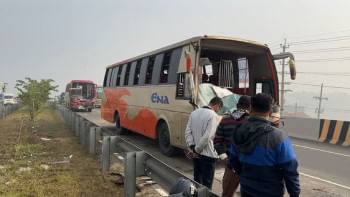Only 4.71pc of candidates are women

A total of 128 female candidates are set to run for 99 seats in the January 7 national election. This is only 4.71 percent of the total 2,713 candidates taking part in the polls.
As many as 68 female candidates contested the 2018 general election. The figure was 3.64 percent of the total candidates, according to Election Commission data.
This time, only 16 out of the 29 political parties that are contesting the polls have fielded 83 female candidates. Besides, 45 women will run as independents.
The Representation of the People Order (RPO)-1972 stipulates that political parties will set aside at least 33 percent of all their committee posts for women, including the central committee. However, the major political parties have yet to fulfil this obligation.
In 2021, the Election Commission set 2030 for fulfilling the obligation.
The ruling Awami League has fielded the highest number of 23 female candidates, including party President Sheikh Hasina, Jatiya Sangsad Speaker Shirin Sharmin Chaudhury, incumbent MPs Matia Chowdhury, Umme Kulsum Smrity, Syeda Zakia Noor, Sagufta Yeasmin, Simin Hossain, Meher Afroze, and Selima Ahmed.
Jatiya Party has nominated nine women, the second highest. However, party Chief Patron Raushan Ershad didn't collect a nomination form.
Only two female MPs, including Raushan, are representing the JP in the 11th parliament. The other lawmaker, Nasrin Jahan Ratna, has secured a party ticket.
JP Presidium Member Salma Islam and Sherifa Quader, wife of party Chairman GM Quader, are among the party's other female nominees.
Only three out of the 91 candidates from Jatiya Samajtantrik Dal are women, including Shirin Akhter MP.
Bangladesh Congress and the National People's Party have nominated eight female candidates each, while the Trinamool BNP has fielded seven. Trinamool BNP Executive Chairman Antora Selim Huda will run for Munshiganj-1.
Among the candidates from Bangladesh Supreme Party, an Islamist party, six are female and one is transgender. Urmi, the lone transgender nominee, will compete for Gazipur-5.
The highest three female candidates will vie for Rajshahi-1. Actor Sharmin Akter Nipa, better known as Mahiya Mahi, will run as an independent as she failed to secure an AL ticket. The two other MP aspirants are NPP's Nurunnesa and independent Shahnewaz Ayesha Akhter Jahan.
Bangladesh Nationalist Movement has nominated singer Doly Shaontoni for Pabna-2 as its lone female candidate.
Fauzia Moslem, president of Bangladesh Mahila Parishad, said women don't feel safe contesting the polls as the current political situation is not stable.
"A conducive environment should be created first to increase women's participation in polls. No institutions, including the Election Commission, come forward to create such an environment," she said.
Fauzia said the EC should scrap the registrations of those political parties that fail to ensure 33 percent representation of women in all their committees.


 For all latest news, follow The Daily Star's Google News channel.
For all latest news, follow The Daily Star's Google News channel. 



Comments